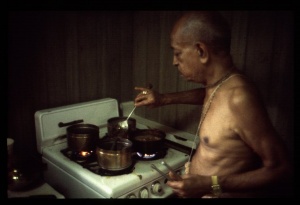SB 3.14.14: Difference between revisions
m (1 revision(s)) |
(Vanibot #0018 edit: make synonym terms in Sanskrit italic in SB - Vanisource) |
||
| Line 1: | Line 1: | ||
{{info | {{info | ||
|speaker=Diti, wife of | |speaker=Diti, wife of Kaśyapa Muni | ||
|listener= | |listener=Kaśyapa Muni | ||
}} | }} | ||
[[Category:Srimad-Bhagavatam - Canto 03 Chapter 14]] | |||
[[Category:Bhagavatam Verses Spoken by Diti, wife of Kasyapa Muni - Vanisource|031414]] | |||
<div style="float:left">'''[[Srimad-Bhagavatam]] - [[SB 3|Third Canto]] - [[SB 3.14: Pregnancy of Diti in the Evening|Chapter 14: Pregnancy of Diti in the Evening]]'''</div> | |||
<div style="float:right">[[File:Go-previous.png|link=SB 3.14.13]] '''[[SB 3.14.13]] - [[SB 3.14.15]]''' [[File:Go-next.png|link=SB 3.14.15]]</div> | |||
{{RandomImage}} | |||
==== TEXT 14 ==== | ==== TEXT 14 ==== | ||
<div | <div class="verse"> | ||
sa viditvātmajānāṁ no | :sa viditvātmajānāṁ no | ||
bhāvaṁ santāna-bhāvanaḥ | :bhāvaṁ santāna-bhāvanaḥ | ||
trayodaśādadāt tāsāṁ | :trayodaśādadāt tāsāṁ | ||
yās te śīlam anuvratāḥ | :yās te śīlam anuvratāḥ | ||
</div> | </div> | ||
| Line 16: | Line 22: | ||
==== SYNONYMS ==== | ==== SYNONYMS ==== | ||
<div | <div class="synonyms"> | ||
''saḥ''—Dakṣa; ''viditvā''—understanding; ''ātma-jānām''—of the daughters; ''naḥ''—our; ''bhāvam''—indication; ''santāna''—children; ''bhāvanaḥ''—well-wisher; ''trayodaśa''—thirteen; ''adadāt''—handed over; ''tāsām''—of all of them; ''yāḥ''—those who are; ''te''—your; ''śīlam''—behavior; ''anuvratāḥ''—all faithful. | |||
</div> | </div> | ||
| Line 23: | Line 29: | ||
==== TRANSLATION ==== | ==== TRANSLATION ==== | ||
<div | <div class="translation"> | ||
Our well-wishing father, Dakṣa, after knowing our intentions, handed over thirteen of his daughters unto you, and since then we have all been faithful. | Our well-wishing father, Dakṣa, after knowing our intentions, handed over thirteen of his daughters unto you, and since then we have all been faithful. | ||
</div> | </div> | ||
| Line 30: | Line 36: | ||
==== PURPORT ==== | ==== PURPORT ==== | ||
<div | <div class="purport"> | ||
Generally the daughters were too shy to express their opinions before their father, but the father would accept the daughters' intentions through someone else, such as a grandmother to whom the grandchildren had free access. King Dakṣa collected the opinions of his daughters and thus handed over thirteen to Kaśyapa. Every one of Diti's sisters was a mother of children. Therefore, since she was equally faithful to the same husband, why should she remain without children? | Generally the daughters were too shy to express their opinions before their father, but the father would accept the daughters' intentions through someone else, such as a grandmother to whom the grandchildren had free access. King Dakṣa collected the opinions of his daughters and thus handed over thirteen to Kaśyapa. Every one of Diti's sisters was a mother of children. Therefore, since she was equally faithful to the same husband, why should she remain without children? | ||
</div> | </div> | ||
__NOTOC__ | |||
<div style="float:right; clear:both;">[[File:Go-previous.png|link=SB 3.14.13]] '''[[SB 3.14.13]] - [[SB 3.14.15]]''' [[File:Go-next.png|link=SB 3.14.15]]</div> | |||
__NOTOC__ | |||
__NOEDITSECTION__ | |||
Revision as of 18:07, 30 November 2017

A.C. Bhaktivedanta Swami Prabhupada
TEXT 14
- sa viditvātmajānāṁ no
- bhāvaṁ santāna-bhāvanaḥ
- trayodaśādadāt tāsāṁ
- yās te śīlam anuvratāḥ
SYNONYMS
saḥ—Dakṣa; viditvā—understanding; ātma-jānām—of the daughters; naḥ—our; bhāvam—indication; santāna—children; bhāvanaḥ—well-wisher; trayodaśa—thirteen; adadāt—handed over; tāsām—of all of them; yāḥ—those who are; te—your; śīlam—behavior; anuvratāḥ—all faithful.
TRANSLATION
Our well-wishing father, Dakṣa, after knowing our intentions, handed over thirteen of his daughters unto you, and since then we have all been faithful.
PURPORT
Generally the daughters were too shy to express their opinions before their father, but the father would accept the daughters' intentions through someone else, such as a grandmother to whom the grandchildren had free access. King Dakṣa collected the opinions of his daughters and thus handed over thirteen to Kaśyapa. Every one of Diti's sisters was a mother of children. Therefore, since she was equally faithful to the same husband, why should she remain without children?